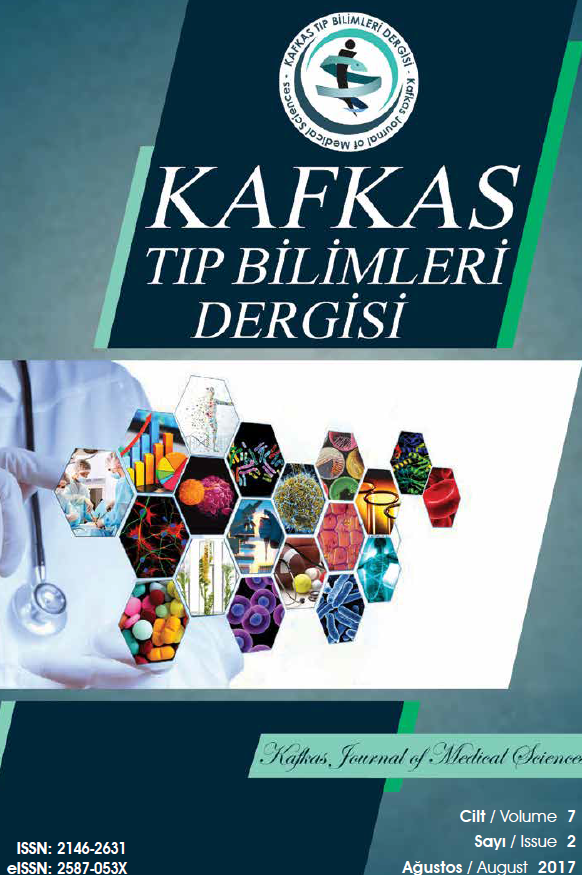Hipertansiyon Hastalarının İlaç Tedavisine Uyumlarında Eğitimin Etkisi
hipertansiyon; sağlık eğitimi; ilaç uyumu
___
- 1. Poulter NR, Prabhakaran D, Caulfield M. Hypertension. Lancet 2015;27 0140–6736.
- 2. Laffin LJ, Bakris GL. Hypertension and new treatment approaches targeting the sympathetic nervous system. Curr Opin Pharmacol 2015;21:20–24.
- 3. Chobanian AV, Bakris GL, Black HR, Cushman WC, Green LA, Izzo JL Jr, et al. Seventh report of the Joint National Committee on Prevention, Detection, Evaluation, and Treatment of High Blood Pressure. Hypertension 2003;42:1206–1252.
- 4. Bakoğlu, E, Yetkin, A. The evaluation of self-care agency of with hypertansion patients. C. Ü. Hemşirelik Yüksekokulu Dergisi 2000;4:41–49.
- 5. Mancia G, Fagard R, Narkiewicz K, Redon J, Zanchetti A, Böhm M et. al. Guidelines for the Management of Arterial HypertensionTheTask Force for the Management of Arterial Hypertension of the European Society of Hypertension (ESH) and of the European Society of Cardiology (ESC). Journal of Hypertension 2013;31(7):1281–357.
- 6. Mert H. A multidisciplinary special study module research: treatment compliance of patients with hypertension. Türkiye Aile Hek Derg 2010;15:17–12.
- 7. Mancia G, De Backer G, Dominiczak A, Cifkova R, Fagard R, Germano G, et al. A guide to the treatment of arterial hypertension 2007. Türk Kardiyol Dern Res 2007;35 Suppl 3:1–75.
- 8. Arıcı M, Çağlar Ş. Hypertension and its problems. Hacettepe Medical Journal 2002;33(1):4–9.
- 9. Hacıhasanoğlu, R. Treatment Compliance Affecting Factors in Hypertension. TAF Preventive Medicine Bulletin 2009;8(2):167–172.
- 10. Gün Y, Korkmaz M. Treatment adaptation and Quality of life of hypertensive patients. DEUHYO ED 2014;7(2):98–108.
- 11. Şarlı, Ş. “Adaptation to Treatment, Affecting Factors and Quality of Life in Patients with Hypertension Disease esi, Thesis in Medicine, Erciyes University Faculty of Medicine Department of Public Health, 2011.
- 12. Mancia G, Backer GD, Dominiczak A, Cifkova R, Fagard R, Germano G et al. Guidelines for the management of arterialhypertension: The Task Force for the management of arterial hypertension of the European Society of Hypertension (ESH) and of the European Society of Cardiology (ESC). J Hypertension 2007;31:1281–357.
- 13. Cingil D. Evaluation of compliance and level of knowledge of patients with hypertension living in Karaman city center, Turkey. Arch Turk Soc Cardiol 2009;37(8):551–556.
- 14. Bell RA, Kravitz RL. Physician Counseling for Hypertension: What Do Doctors Really Do? Patient Education and Counseling 2008;(72):115–121.
- 15. Hacıhasanoğlu R, Gözüm S, Çapık C. Validity of the Turkish version of the medication adherence self-efficacy scaleshort form in hypertensive patients. Anadolu Kardiyol Derg 2012;12:241–248.
- 16. Şahin, ŞN. The Effect of Patient Adaptation in Patients with Hypertension Management and an Initiative for the Understanding of Patients’ Health. Adnan Menderes University Faculty of Medicine Department of Family Medicine, Thesis, 2014.
- 17. Graves JW. Management of diffucult to control hypertension. Mayo Clinic Proceedings 2000;75:278–284.
- 18. Xu LJ, Meng Q, He SW, Yin XL, Tang ZL, Bo HY et al. The Effects of health education on patients with hypertensiyon in China, a Meta-Analsis. Health Education Journal 2014;73:137–149, .
- 19. Çakır, H. The effect of education given to patients with hypertension on healthy lifestyle behaviors and hypertension management ert Master Thesis, Marmara University Institute of Health Sciences, Istanbul, 2003.
- 20. Taş F. Hypertension Awareness and Role of the Nurse. TAF Prev Med Bull 2013;12(6):729–734.
- 21. Ni Y, Chen Y, Huang W. The Effects of Pharmaceutical Care Programs on Blood Pressure Control in İndividuals With Hypertension, a Meta-Analsis, The Journal of Pharmacy and Tecnology 2009;25:292–296.
- 22. Kuçer AM, Özbay A. Efects of patient education and counseling about life style on quality of life in patients with coronary artery disease. Anadolu Kardiyol Derg 2011;1:107–113.
- ISSN: 2146-2631
- Yayın Aralığı: Yılda 3 Sayı
- Başlangıç: 2011
- Yayıncı: Kafkas Üniversitesi
Kalsiyum Kanal Blokerlerinin Pleiotropik Etkileri
Şerife CANBOLAT, Kısmet Esra NURULLAHOĞLU ATALIK
Yanak Pleomorfik Adenomu: Nadir Yerleşimli Bir Olgu Sunumu
Kenan ÇADIRCI, Havva KESKİN, Nihat OKÇU
Eritrosit İndeksleri ve Eritrosit Sedimentasyon Hızı Arasındaki İlişkinin Araştırılması
Ergin TAŞKIN, Seda ÇELİK, Duygu Mine YAVUZ, Fatih KARA
Toraks Travması: 440 Olgunun Değerlendirilmesi
Miktat Arif HABERAL, Özlem ŞENGÖREN DİKİŞ, Erkan AKAR
Hipertansiyon Hastalarının İlaç Tedavisine Uyumlarında Eğitimin Etkisi
Gestasyonel Diyabet, Metabolik Sendrom ile İlişkili midir?
Emel Arslan YILDIRIM, Mehmet BÜLBÜL, Kemal ÖZERKAN, Osman Haldun DEVELİOĞLU
Buket BÜYÜKTURAN, Caner KARARTI, Alperen KILIÇ, Öznur BÜYÜKTURAN
Perilunat Çıkığı ve Kırıklı Çıkığı Bulunan Hastalarda Erken Müdahalenin Erken Sonuçları
Yavuz AKALIN, Gökhan CANSABUNCU, Nazan ÇEVİK, Alpaslan ÖZTÜRK
